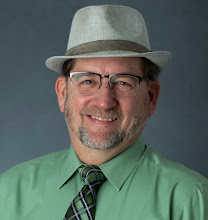I am also a bit unorthodox. I don't like to do what everyone else is doing, or in the way they are doing it. When my friends in fourth grade were learning how to play guitar, I decided I would take up banjo. But I didn't learn bluegrass (at least not at first); no, I learned classical - with actual sheet music, not tablature and chords. I eventually learned to play the guitar, but not electric or folk - I went with Spanish, mixing classical technique with latin strumming patterns. Malagueña was my favorite. (It still is, but I only remember bits and pieces.) As a math major in college, I spent a semester in France, studying literature, food, and wine. As a seminary student, I worked for a defense contractor doing software design. The placement office told me no church would ever hire me as a pastor, because I clearly didn't "fit the mold".
So how does an unorthodox contrarian end up as a small-town preacher? I can only say that God has a sense of humor. In fact, I suspect God may be a bit of an unorthodox contrarian, too. For in all my years of reflection and struggle to know what God expected from me, I never once felt that God wanted me to conform, to "fall in line" with what others were doing, or had done before. God has always seemed even more willing and eager than I am to blaze new trails, to try a fresh approach, to inspire creative innovation. And so, to make a long story less long, I have ended up being, doing, and loving a life that is nothing like what I expected, not like any other life I know. (If you know of another bi-vocational tri-denominational rural pastor who runs a software design and financial consulting firm, let me know. We would have a lot to talk about.)
But where the unorthodox contrarian spirit really shows up is not in church, or in career choice, or in musical tastes. It is in the experience of life itself. From the first time I saw a velvet rope across the staircase in a movie theater, I have always longed to see what I wasn't supposed to see, to go where I wasn't supposed to go, to understand what I wasn't supposed to know, to discover what was being concealed. But alas, I have only rarely and timidly pursued that longing, all too aware of the preponderance of stern warnings and ominous forebodings. High voltage, dangerous curves, dense fog, slippery rocks - "Danger, Will Robinson" echo the robotic alerts, with metallic arms flailing. Do not enter, no admittance, authorized personnel only - restrictions clearly lifted for some, but supposedly not for me. Sign, sign, everywhere a sign. It gets, well, oppressive.
Be forewarned, this may not sound like a "Christian" thing to say -- certainly not "ministerial" -- but the truth is: the signs don't work. They don't actually keep people out. They may give friendly guidance to those with cooperative spirits, but they do nothing to quell curiosity or suppress adventure. They don't teach discernment, they don't foster maturity. (If you think a velvet rope is actually going to cultivate discipline and self-control, then you cut too many classes in Psych 101.) To short-circuit a prolonged and redundant analysis, let me simply state the obvious: all of our efforts to control each other's behavior (especially on moral or ethical grounds) are patently ineffective at best, and dysfunctionally counter-productive at worst.
We really don't need all the signs. If you can't figure out that an icy bridge is slippery, without a yellow sign to tell you, you don't belong behind the wheel. If you need a warning label to tell you not to use lemony dish soap in your custard, please stay out of my kitchen. More to the point, if you can't sort out the profound effect that various foods and drinks and drugs and sex have upon your mind and body, without referring to published guidelines from your regional moral rule-writers, then you're really not paying attention.
We really don't need more rules.
We need more faith...
in our own understanding of righteousness,
in God's promise to write his laws on our hearts,
in God's assurance of wisdom to those who seek it,
in the guidance of God's spirit in every situation.
We need forgiveness when we fail to trust,
when we learn things the hard way.
We need grace to believe that our hearts
can be made trustworthy and whole once again.
And all of these things that we need, God gives.
For free.
Since you died with Christ to the basic principles of this world, why, as though you still belonged to it, do you submit to its rules: "Do not handle! Do not taste! Do not touch!"? These are all destined to perish with use, because they are based on human commands and teachings. Such regulations indeed have an appearance of wisdom, with their self-imposed worship, their false humility and their harsh treatment of the body, but they lack any value in restraining sensual indulgence.
-- Colossians 2:20-23 (NIV)
-- Brother Tom


No comments:
Post a Comment